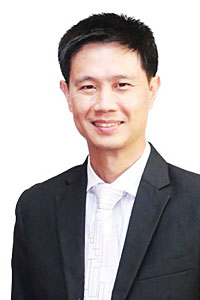
'Are you Thai?" is a catchphrase Prime Minister Prayut Chan-o-cha loves asking people whom he thinks give our beloved country a bad name.
The ruling general used this popular question again at a news conference on Tuesday after a weekly cabinet meeting, erupting in anger at a young woman who posted a photo of herself "taking a bath" in one of many potholes on the road to her village in Tak province, the newspapers that published the report and local authorities that failed to do their job.
"Where is The Nation?" the junta chief shouted from his podium asking for a journalist from that newspaper.
"Where are Matichon and Khaosod? Just keep writing and publishing photos of the roadside bathing. The whole world is reviling us. Don't you feel embarrassed?," said the country's 29th prime minister whose media blasting rituals are a common element of a news conference.
But do journalists deserve such a dressing down? Should Thais who suffer negligence or the appalling work of local government agencies not make their complaints public? Or should the media just report "constructive" news that government spin doctors churn out daily? Not at all.
The media should be proud, not ashamed, of performing its duty in reporting the plight of the 22-year-old Thai-Karen woman who successfully got the attention of local authorities regarding the poor condition of the road to her village in the remote Mae Ramat district.
The young lady and every Thai should and must expose any wrongdoings by government officials whose salaries are paid by our tax money.
The media are the watchdog that barks at suspicious acts of those in power. We must not be afraid, nor ashamed of exposing scandals of top political power holders, no matter they offer themselves to be elected to do the work for the interests of the public or use guns and tanks to gain control.
It is the role of the media to inform the public of any suspected wrongdoings committed by people who live on taxpayers' money. It is the duty of these power holders to answer those allegations, not to conceal nor trying to shut up or shut down their critics.
The exposure of Defence Minister and Deputy Prime Minister Prawit Wongsuwon's 20.9-million-baht chartered flight to the Asean-US defence meeting in Hawaii last week was also made known to the public by a young freelance journalist. Thanks to those who shared the details of the expenditure on this trip with the public, we, the taxpayers, have learned that transparency and disclosure of information is an excellent tool in checking abuses of power of our appointed politicians and their staff.
We now know how hard or comfortable the life our "public servants" were having while travelling on a business trip, what kind of dishes they enjoyed on board and the people the boss brought on his entourage.
Had Gen Prayut known that a routine web-surf by a freelance journalist would have become a national scandal, the regime boss may also have cast doubt on this young reporter's patriotism.
What the journalist found moved from just a post on his Facebook page to make it into a long-running story on the covers of national newspapers. Then came damage-control mode. After several explanations by Gen Prawit and the prime minister failed to convince the public that the trip was business as usual, neither lavish nor exorbitant, legal action is being taken against those who "illegally" disclosed private information.
Thai Airways president Charamporn Jotikasthira said on Thursday the airline has filed a police complaint against the well-known Facebook page "Stop Fake Thailand" or "Yut Datcharit Prathet Thai" at the Technology Crime Suppression Division, after it released a list of people alleged to have accompanied Gen Prawit on the trip. "Inaccurately" publishing the passenger list, which was deemed confidential, damaged the airline's reputation, the airline's lawyer said.
Like other scandals in the past two years, "Hawaiigate" will eventually dissipate. But we Thais can't turn a blind eye to corruption. As Privy Council President Prem Tinsulanonda nicely summed up in his speech yesterday at an anti-graft seminar, the root cause of the country's corruption problem is the patronage system.
"I have no clue how to tackle the patronage system... It is fair to says Thais like helping wrongdoers because they have to reciprocate to those who have helped them," he said, calling on all Thais to be obliged to "return the favour to their motherland by fighting graft and other forms of corruption", which in the nonagenarian's words, is tantamount to "robbing the country."
Nopporn Wong-Anan is Deputy Editor, Bangkok Post.
